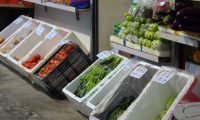Xu Yihan (UID: 3036102218)
Wang Dongtong (UID: 3036099394)
- Video essay
Youtube link: https://youtu.be/LO3K_4JWT0U
- Text transcript
Carina: This is our video podcast of CCHU9034. I’m Xu Yihan. This is my partner Wang Dongtong.
Katherine: Today we will talk about the vanishing city. These days we went to the Man Wah Building which is the filming site of the ‘Breaking News’.
Carina: During the trip, we saw many buildings and facilities that have existed for a few decades, such as laundries, restaurants, and barbershops. Among all the facilities we saw, the traditional food market will be discussed as our topic. The main reason why we chose this as our project is rapid urbanization, changing consumer preferences, and the rise of modern markets and online grocery platforms.
Katherine: Now we turn to the first reason. The accelerated pace of urbanization is a significant factor contributing to the disappearance of traditional food markets. As cities expand and modernize, there is a growing demand for space for accommodation and commercial purposes. Stalls like the one in the picture, where the vendor places fruits and vegetables directly on the street, making the narrow road more difficult to pass. So, the government encourages online grocery platforms, which can reduce the occupation of these places.
Carina: That’s true, the online grocery platforms give the residents diverse choices and save more time. As urban populations diversify, preferences for convenient, one-stop shopping at supermarkets or online platforms may rise. Supermarkets often provide a more controlled and cleaner environment. The convenience factor together with the high quality has drawn customers away from the traditional markets to the modern supermarket. That’s why the younger people with different consumption patterns mainly contribute to the decline of traditional markets.
Katherine: But the factor that affects the fall in the quantity of traditional food market is not only this reason. Another reason why the markets in Hong Kong are becoming less is that more and more residents are traveling to Shenzhen to buy food. The cause of this phenomenon is that many convenient transport routes to Shenzhen such as MTR and minibus, and it takes about an hour to reach the Luohu and Futian Port. Due to the low fares for traveling to and from Shenzhen and the more affordable Shenzhen supermarkets, many residents choose to go to Shenzhen to buy food and daily necessities to save money.
Carina: According to the Hong Kong Immigration Department, more than 4.68 million trips were made by Hong Kong residents to the north in July 2023, and the estimated spending could reach HK$4 billion. According to China Youth Daily, data from Alipay, China’s Hong Kong version, showed that the amount and number of purchases made by Hong Kong people on the mainland in the second quarter of last year rose by more than three times compared to the first quarter.
Katherine: Yes, this situation is present. In the past, traditional markets were vital for local farmers and producers, offering them a direct place to sell their goods. This direct-to-consumer model promoted sustainable agriculture and helped small-scale producers thrive. Besides, the traditional food markets have a rich historical background. These markets were not merely places of transaction but were deeply intertwined with cultural practices, reflecting the culinary traditions and diverse identities of the local population.
Carina: You are right. While considering the traditional markets, they are facing commercial challenges in the present day, including competition from modern supermarkets and online platforms. The economic landscape has shifted, influencing the viability of these markets as primary sources of income for vendors. Besides, some traditional markets have adapted to changing times by repositioning themselves as tourist attractions. Their historical significance and the opportunity to experience local flavors attract both locals and visitors. So now, the traditional market is facing a big challenge. Let’s discuss the effect when the traditional market no longer exists.
Katherine: Certainly. Local farmers and small-scale producers will be significantly affected as they lose a vital place for selling their products.
Carina: Oh true, they had to find new ways of making a living to make ends meet. The disappearance of markets can lead to economic hardships for these individuals and their families.
Katherine: The consumers who value the unique experience of shopping in a traditional market will lose a cultural touchpoint. As mentioned, the elderly will be more affected. Some may feel a sense of homesickness and loss as the market becomes a thing of the past.
Carina: Not only the vendors and the consumers, but the disappearance of food markets can also erode the sense of community. When everyone uses online platforms for shopping, face-to-face communication becomes less and less frequent, so like in many residential buildings on the mainland, there is little contact between neighbors.
Katherine: To cope with the declining number of traditional food markets, there are several measures. The first can be cultural advocacy, this can be achieved by some organizations and individuals passionate about preserving cultural heritage. For example, they can make some efforts to raise awareness about the significance of cultural values and the potential consequences of their disappearance. Carina, do you have any thoughts on preserving the traditional food market?
Carina: Well, I think the traditional food markets can make some adaptations and innovations, such as incorporating modern elements. For example, many food markets have begun to focus on the creation of creative neighborhoods to attract young people. I have heard that the luxury brand Prada and Shanghai Wuzhong market cooperated in organizing a flash mob activity in September 2021, and the vegetable market has become a fashion show. I think this can be a good example for Hong Kong to learn.
Katherine: In general, the progress of the times inevitably leads to the elimination of the products of the old society, but they have assumed an immensely important part in the passing of history. Well, this is all for today, how will the future of the traditional food market will change? Nobody knows, but we can keep watching how the traditional food market survives and evolves in the modern world.





